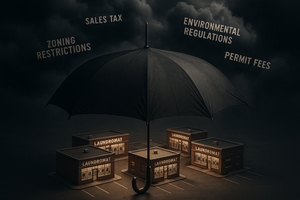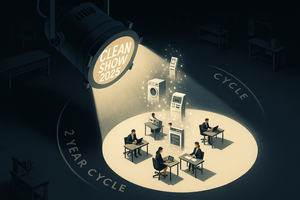Where Laundry Owners Shape Their Businesses for Tomorrow
Limited Seats. Unlimited Opportunity.
Join the exclusive circle of laundry industry owners/operators driving real change. This isn't a conference, it's the strategic advantage successful owners/operators don't skip.
✓ Elite Access - Connect with peers driving breakthrough results
✓ Proven Results - Access proven strategies from top performers
✓ For Owners/Operators - Carefully curated empowering content and speakers
"Finally, a detailed event designed for Laundry Owners by Laundry Owners."
— Multi-Store Owner/Operator
Reserve your seat today.
Limited capacity for this gathering.
After a call with Brian Wallace, the CEO of the CLA, I got to thinking, what if there was no CLA?
Simple question, but the more I thought about it, the more I wondered. To understand what it could be like, let's look at what happened to another industry when their trade association collapsed.
Between 2017 and 2019, a dramatic implosion in trade association history unfolded. The Grocery Manufacturers Association, a 110 year old association representing major food companies, began loosing members at an alarming rate. Campbell Soup Company decided to leave GMA in 2018, saying the trade association no longer represented its views. Three months later, the world's largest food company, Nestlé, announced it was leaving. Then the floodgates opened, Dean Foods, Mars, Tyson Foods, Unilever, the Hershey Company, Cargill, the Kraft Heinz Company, and DowDuPont all opting to leave.¹
These high profile departures will likely cost GMA millions of dollars in lost membership dues; one top lobbyist with a former member company speculates the association may lose about half of its former financial might.¹ The industry voice that had existed for over a century was falling apart.
What happened next? These companies gave up on the trade group, and left, figuring they could just as easily represent their interests in Washington on their own. The result was chaos, companies had to lobby individually, spend more resources doing what the association used to do collectively, and the industry lost its unified voice on critical issues.
The Legislative Vulnerability
Right now, many of us probably don't think about sales tax. 42 out of 45 of the states that levy a general sales tax exempt self-service laundry from the tax. Three states charge sales tax on self-service laundry (Hawaii, New Mexico, and West Virginia).² But this protection didn't happen by accident.
For more than 30 years, CLA's top legislative priority has been to protect the exemption from sales tax enjoyed by the self-service laundry industry in many states.² Without that coordinated defense, what's stopping other states from looking at laundromats as an easy revenue source?
Look at what nearly happened in Iowa, where legislators have proposed a sales tax that would effectively turn a $2.00 wash into a $2.11 wash. For coin-only laundromats, this creates a challenging situation since many can only be increased by multiples of 25 cents.³
Without the CLA, would we see states looking at laundromat operators for addition revenue? Would individual owners/operators have the resources to fight sales tax expansion, environmental regulations, or zoning restrictions, state by state?
The Information Chaos
The laundry industry already struggles with misinformation and questionable "gurus" selling dreams about passive income and easy money. Without an authoritative industry voice, who would new investors trust for reliable information?
Think about challenges new owners/operators might face. Some municipalities require laundromats to obtain an environmental discharge permit to release lint.⁴ There are zoning laws, fire safety codes, building permits, utility permits, and wastewater regulations.
Without the CLA providing guidance and advocating for reasonable standards, would each operator be left to figure out this maze individually? Would we see more predatory consultants filling the information void?
Manufacturers
Here's where the GMA example becomes particularly relevant. When that trade association weakened, large companies like Nestlé and Unilever were fine, they had the resources to lobby Washington individually. But smaller companies lost their collective voice.
In our industry, this disparity would be even more stark. Manufacturers, some distributors, and large laundromat chains might be able to hire lobbyists and navigate regulatory challenges on their own. But what about the single location owner/operator trying to battle regulations?
One collective voice gives small owner/operators the same advocacy power as larger companies. Without it, would regulatory changes favor whoever has the biggest lobbying budget?
Real World Consequences
We can see what happens when industries lose their collective voice. Take Michigan's commercial laundry operators, who discovered they were at a competitive disadvantage with competitors in neighboring states because of different tax treatments. Michigan laundry operations say they must pay the sales or use tax on the textiles and related supplies they purchase to service their customers, but their competitors in Ohio do not under their state law.⁵
Without coordinated industry advocacy, these kinds of competitive disadvantages multiply. Different states develop different rules, creating a patchwork of regulations that benefit whoever has the resources to navigate them best.
The Hidden Value
Trade associations become invisible when they're working well. You don't notice the legislative battles that never happen, the bad regulations that never get proposed, or the information chaos that never emerges.
The median household income of a typical self-service laundry client is $23,000 per year.² The CLA's work to maintain sales tax exemptions directly protects these families from what would be a regressive tax on a basic necessity.
The association provides an authoritative voice that helps owners/operators distinguish themselves from the stream of "laundry gurus" promising unrealistic returns to new investors.
Thinking about the thinking of laundry:
When you realize that preventing problems outweighs solving them, you value preventive measures differently.
What More Could the CLA Do for You?
This thought experiment got me wondering. If you could wave a magic wand and have the CLA do one more thing for our industry, what would it be?
Would it be additional educational resources for owners/operators, more regional/local networking events, better communication about legislative battles, or advocacy in areas they haven't tackled yet. Maybe it’s services that would help you grow your business, or support that would make compliance easier.
I'd love to hear your thoughts, not about what's wrong, but about what additional value the CLA could provide that would make our industry stronger.
The Bottom Line
The GMA's near collapse shows us what happens when an industry's collective voice fragments. Companies end up spending more resources, losing coordination on critical issues, and watching smaller players get squeezed out.
That's all I got for you today.
Waleed
Join me on Linkedin, YouTube, or X (Twitter)
Echoing the thoughts of an African Proverb.
If you want to go fast, go alone. If you want to go far, go together.
Footnotes:
¹ Food manufacturers are leaving the Grocery Manufacturers Association, signaling an end of the Big Food era - Quartz, 2022
² Stop Laundry Tax - CLA, The Laundry Association, 2024
³ What you need to know about the self-service laundry tax - Card Concepts Inc., 2019
⁴ Laundromat Regulations & Safety Compliance, 2025
⁵ Laundries: sales & use taxes - Michigan Legislature, 1997
1. The Lean PUD StartUp Blueprint (FREE): Launch a lean pickup & delivery business for under $2,000 with the free 7-day email course covering suppliers, tech stack, marketing, and implementation. Get the blueprint
2. Wash Weekly Newsletter (FREE): Every Sunday, unlock insights to grow your profits and become a market leader in just 5 minutes. Subscribe here
3. Laundry CEO Podcast (FREE): Learn from successful laundry owners who share their stories and strategies to help you excel in the industry. Watch now - Listen now





